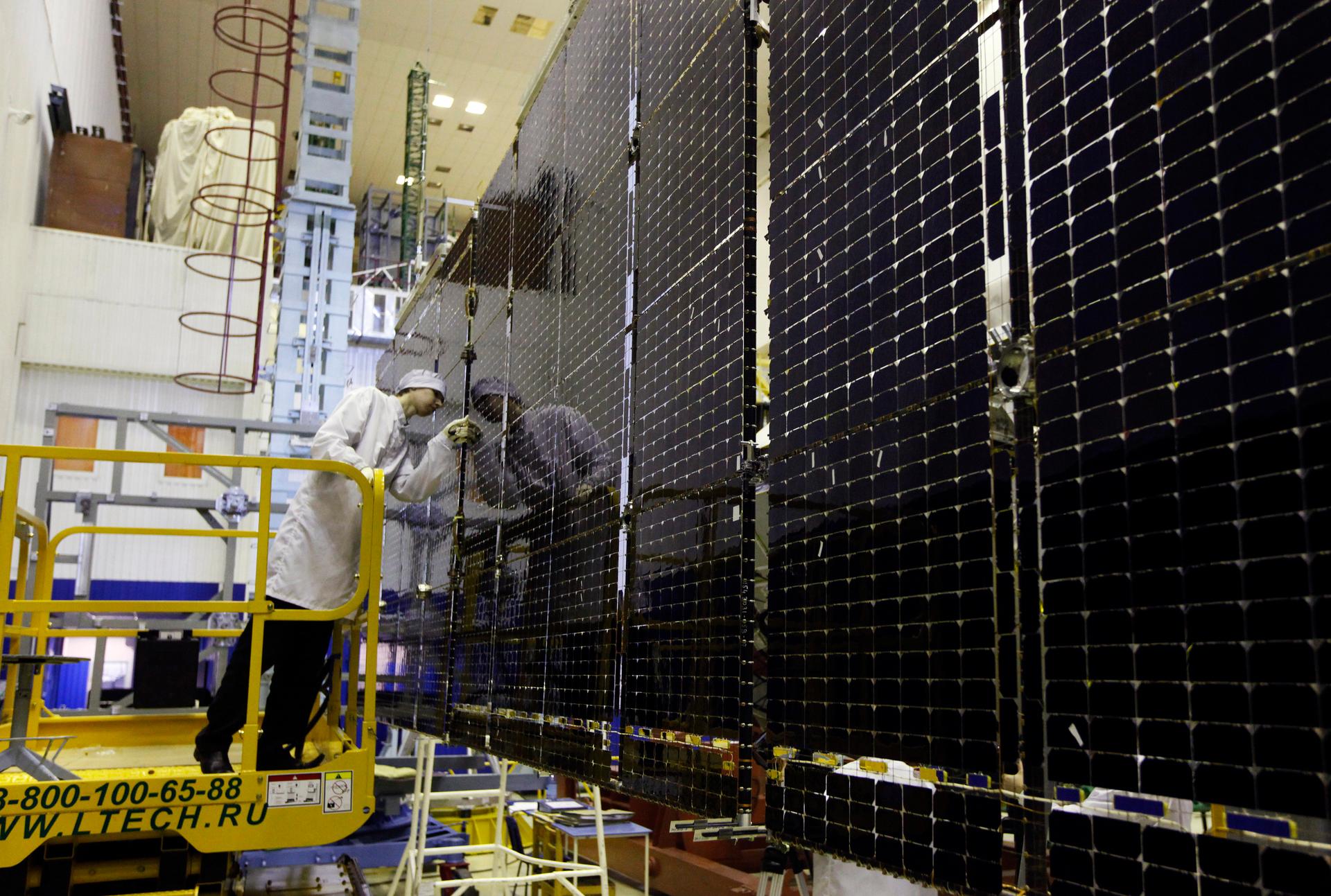Israel Space Agency fears launchpad explosion could jeopardize China deal
A specialist works on a solar battery, being constructed for the Israeli AMOS-5 space telecommunication satellite, at the open joint-stock company Reshetnev Information Satellite Systems in the Siberian town of Zheleznogorsk, on March 31, 2011.
The launchpad destruction of an advanced Israeli communications satellite may have dealt a blow to the country's aerospace industry, the Israel Space Agency (ISA) said Friday.
The unmanned SpaceX Falcon 9 rocket exploded during a test in Florida on Thursday, destroying the Israeli-built and -owned Amos 6 satellite that Facebook planned to use to beam high-speed internet to sub-Saharan Africa.
Dramatic footage broadcast by ABC News showed the rocket burst into a ball of flame amid what appeared to be a succession of blasts — sending its payload tumbling to the ground as a dense plume of black smoke filled the air.
ISA chairman Yitzhak Ben Yisrael said the blast's shock waves could reverberate far beyond Cape Canaveral.
He said the incident could jeopardize a pending deal for the sale of private Israeli firm and Amos-operator Spacecom to China's Xinwei group, reportedly worth $285 million and conditional on the satellite successfully entering service.
"This is the second blow, ahead of the Chinese deal," Ben Yisrael said, recalling the blackout of the Amos 5 satellite, which like Amos 6 was owned and operated by Spacecom.
Communication with the Franco-Italian made Amos 5 was lost in November 2015, four years after it was launched from Kazakhstan.
"There is a major question about the launch and I very much hope that Spacecom is strong enough to overcome these things and to order a new satellite," Ben Yisrael told Israeli public radio.
"If it orders a new satellite, it will take between two and three years to fill the gap."
'Strategic' business for Israel
Amos 6 manufacturer Israel Aircraft Industries (IAI) said the satellite was "the largest and most advanced communications satellite ever built in Israel."
"Obviously, we are disappointed about this incident in the launch vehicle and are ready and willing to assist Spacecom in any manner," it said.
"The communications satellite business is strategic for IAI and the State of Israel."
The Israel Space Agency, part of the country's science ministry, said that "support for the space industry in Israel will continue with the aim of continuing at the forefront of technology."
It said Science Minister Ofir Akunis would convene industry leaders on Sunday for "an emergency debate and situation report."
David Zusiman, former project manager for the Amos 3 and 4 satellite projects and involved with the early stages of Amos 6, said the explosion was a setback but not necessarily a disaster.
"Amos 6 can be replaced by an identical satellite which it will be possible to order immediately, thanks to the insurance money they will get," he said in an interview on public radio.
"The insurance is supposed to cover the cost of a complete satellite, including a new launch."
The Amos 6 has an estimated value of between $200 million and $300 million, according to John Logsdon, former director of the Space Policy Institute at George Washington University.
"The problem is that Amos 6 was supposed to replace Amos 2 which is now quite old and needs replacing," Zusiman says.
"There are a number of satellites on the international market which could match Amos 2, they are also old but they could still work for a few more years," he says.
"The clients who bought the extra capability of Amos 6 could suffer damage because it sets back their programs by two to three years," he says. "I don't know if the image of the Israeli space industry will be harmed."
Logsdon concludes: "From a rational point of view there was a fault with a small part of the system. The rocket is reliable, it works. The IAI satellite has 100 percent success in space, something very rare."
Our coverage reaches millions each week, but only a small fraction of listeners contribute to sustain our program. We still need 224 more people to donate $100 or $10/monthly to unlock our $67,000 match. Will you help us get there today?
